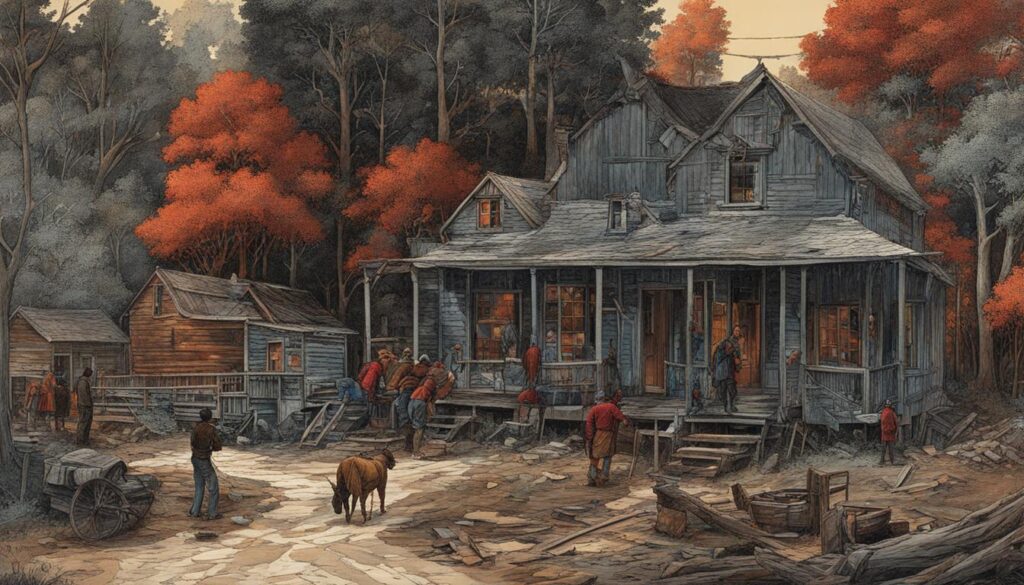If you’re an audiobook enthusiast seeking a candid review of Clint Smith’s literary masterpiece, “How the Word Is Passed,” look no further! This book is a gripping, emotional, and complex exploration of America’s history through its historic landmarks. Smith takes the reader on an intellectually engaging journey, revealing the hidden stories of the past that have shaped the nation.
In this article, we’ll provide an overview of “How the Word Is Passed,” discuss Clint Smith’s background, explore the book’s key themes, and dive into the critical reception. We’ll also touch on the historical accuracy of Smith’s research and discuss the impact of the audiobook on raising social awareness. Finally, we’ll provide our thoughts on the audiobook’s narration and listening experience.
If you’re ready for an insightful deep dive into America’s history, this audiobook review of “How the Word Is Passed” is for you.
Overview of “How the Word Is Passed”
Clint Smith’s “How the Word Is Passed” is a poignant and thought-provoking audiobook that explores America’s history in a unique and compelling way. Smith takes listeners on a journey through various historic landmarks, unraveling the untold stories and forgotten narratives that often lie dormant beneath the surface. With his engaging storytelling style, he highlights the cultural and historical significance of each landmark, shedding new light on America’s complex past.
The central theme of the book is the examination of America’s history through its landmark sites, illustrating how each place ties into America’s larger narrative of colonialism, slavery, segregation, and identity. Smith’s book is a moving tribute to the people and events that have shaped America, providing a valuable framework for understanding the nation’s past and present.
Landmarks explored in “How the Word Is Passed”
| Landmark | Location | Historical Significance |
|---|---|---|
| The Monticello Plantation | Virginia | Thomas Jefferson’s home and the center of his political, social, and economic world |
| The Whitney Plantation | Louisiana | Site of the only plantation museum in Louisiana with an exclusive focus on slavery |
| The Angola Prison Complex | Louisiana | Former slave plantation turned prison that currently incarcerates more Black men than any other correctional facility in the US |
| The Confederate Memorial Park | Alabama | Site of the largest Confederate military training camp during the Civil War |
| The Edmund Pettus Bridge | Alabama | Site of the violent police backlash against the peaceful Selma to Montgomery march in 1965, which galvanized public opinion and helped pave the way for the Voting Rights Act of 1965 |
In each of these locations and more, Clint Smith brings his unique voice to bear, delving into the history and significance of each place with empathy, insight, and an unwavering dedication to truth-telling. “How the Word Is Passed” is a deeply researched, moving, and important work that deserves to be heard by all those interested in America’s history and its legacy in the present.
Author Background: Clint Smith
Clint Smith is a writer, scholar, and teacher, born and raised in New Orleans, Louisiana. He received his Ph.D. in Education from Harvard University, where he studied the intersections of race, education, and incarceration.
Smith has published two poetry collections, Counting Descent and How the Word Is Passed, both of which explore the complexities of race and history in the United States. How the Word Is Passed has been widely acclaimed for its insightful and thorough exploration of America’s history and landmarks.
Aside from his writing, Smith is also a well-respected educator and has taught at multiple universities, including Harvard University and the University of Chicago.
With his deep knowledge of American history and his eloquent writing style, Clint Smith proves to be a valuable voice in the ongoing conversation about the country’s past and present.
Education and Qualifications
Clint Smith obtained his Bachelor’s degree in English from Davidson College, North Carolina, and his Master’s in Teaching from Relay Graduate School of Education, New York. He later went on to earn his Ph.D. in Education from Harvard University in 2020.
Throughout his academic career, Smith has been a recipient of numerous awards and fellowships, including the National Science Foundation Graduate Research Fellowship, the Josephine De Karman Fellowship, and the Ford Foundation Predoctoral Fellowship.
Early Career and Writing
Before becoming a published author, Clint Smith taught high school English in Prince George’s County, Maryland, through Teach For America. It was during this time that he honed his writing skills, starting a poetry blog and participating in various spoken word competitions across the country.
In 2014, he published his first poetry collection, Counting Descent, which has since won several awards and nominations, including the Literary Award for Best Poetry Book from the Black Caucus of the American Library Association. His second poetry collection, How the Word Is Passed, was published in 2021 and has already garnered critical acclaim and recognition.
“It’s incredibly important that we take seriously the act of telling our story as a country. And we can’t tell the story if we’re only telling some of it.”
Exploring America’s Historic Landmarks
America’s history is deeply intertwined with its historic landmarks. These landmarks serve as important reminders of the country’s past, from its triumphs to its dark periods. In “How the Word Is Passed,” Clint Smith explores various American landmarks and their cultural and historical significance.
The book discusses landmarks such as Monticello, Whitney Plantation, and the Edmund Pettus Bridge, shedding light on the untold stories and forgotten narratives associated with each of them. Through his writing, Smith highlights how these landmarks played a role in shaping America’s history, often in ways that have been overlooked in mainstream narratives.
Monticello and the Legacy of Slavery
Monticello, the home of Founding Father Thomas Jefferson, is often regarded as a symbol of American exceptionalism. However, Smith’s exploration of the landmark offers a new perspective. He reveals the dark history of Monticello, detailing Jefferson’s ownership of hundreds of slaves and the exploitation of their labor to build the estate.
Smith’s narrative sheds light on the harsh realities of slavery at Monticello, highlighting the lives and struggles of some of the enslaved people who worked on the plantation. This section of the audiobook offers a reminder that history is not always what it seems, and the stories of marginalized voices must be brought to the forefront.
Whitney Plantation and the Horrors of Slavery
The Whitney Plantation in Louisiana is one of America’s few museums dedicated to the story of slavery. In this section of the book, Smith takes readers on a tour of the plantation, highlighting the horrors of slavery that occurred there.
The author describes the brutal circumstances under which enslaved people on the plantation lived and worked. He also emphasizes the ways in which slavery was a fundamental part of the American economy, deeply woven into the fabric of American society.
The Edmund Pettus Bridge and the Struggle for Civil Rights
The Edmund Pettus Bridge in Selma, Alabama, holds a significant place in the history of the American Civil Rights Movement. The landmark is named after a Confederate general and former Ku Klux Klan leader, making it a symbol of the country’s segregated past.
In this section of the book, Smith explores the events that took place on the bridge, including the Bloody Sunday march in 1965. Through his vivid storytelling, he illustrates the bravery of civil rights activists who endured violent attacks as they fought for equal rights and justice.
Through Smith’s exploration of these landmarks and others, “How the Word Is Passed” offers a powerful reminder of the historical significance of America’s heritage sites. It encourages readers to confront the country’s past, providing much-needed context to our present moment.
Untold Stories and Forgotten Narratives
Clint Smith’s “How the Word Is Passed” is an important audiobook that sheds light on the untold stories and forgotten narratives associated with America’s historic landmarks. Through evocative storytelling, Smith challenges the mainstream narratives that often overlook marginalized voices and hidden histories. By presenting a diverse and inclusive account of America’s past, he encourages listeners to confront the uncomfortable truths that have been buried in the country’s historical records.
In the audiobook, Smith examines the colonial legacy of Jamestown, Virginia, the role of Monticello in the construction of Thomas Jefferson’s identity, the enduring legacy of slavery in Louisiana, the impact of segregation in Chicago, and the historic significance of the 16th Street Baptist Church in Birmingham. He also explores the impact of Hurricane Katrina on New Orleans, weaving together the stories of residents and survivors to highlight the ongoing struggle for racial justice in America.
Through his audiobook, Smith demonstrates that hidden histories and forgotten narratives can reveal a deeper, more nuanced understanding of America’s past. By acknowledging the stories of those who have been historically marginalized, Smith encourages listeners to reimagine their relationship with history and to push for a more equitable future.
Narrative Style and Engaging Storytelling
Clint Smith’s “How the Word Is Passed” stands out for its vivid and compelling narrative style and engaging storytelling techniques.
His writing brings history to life by blending historical facts with personal experiences and critical analysis. Using a variety of storytelling approaches, including vivid description, anecdotes, and testimonials, Smith engages readers and listeners alike in an immersive journey through America’s history.
Listeners will find themselves captivated by the audiobook, as Smith’s powerful and passionate voice draws them into the stories of America’s landmarks and the people who shaped them.

One standout technique used by Smith is his ability to intertwine historical facts and personal experiences, which brings an emotional resonance to the stories. By sharing his perspectives as a Black man, Smith provides a unique lens through which to view America’s history that is often missing in mainstream narratives.
“There is something deeply persuasive about reading history through the eyes of someone who has experienced it firsthand. It offers a more personal and powerful way to understand the past and its impact on the present.”
The combination of Smith’s storytelling techniques and his personal connection to the history he portrays makes “How the Word Is Passed” a truly immersive and insightful audiobook experience.
Critical Reception and Awards
Since its release, How the Word Is Passed has received widespread critical acclaim. The book has been praised for its insightful exploration of America’s history through its historic landmarks and its ability to shed light on untold stories and forgotten narratives.
Some of the notable awards and accolades received by the audiobook include:
| Award | Category | Recipient |
|---|---|---|
| 2021 Audie Awards | Nonfiction | Clint Smith (Author/Narrator) |
| 2021 Andrew Carnegie Medal for Excellence in Nonfiction | Winner | Clint Smith |
| 2021 NAACP Image Awards | Outstanding Literary Work – Nonfiction | Clint Smith |
Reviews of the audiobook have also been overwhelmingly positive. Many critics have praised Clint Smith’s engaging writing style and his ability to bring history to life through storytelling.
“How the Word Is Passed may be an audiobook, but it reads like a musical journey through America’s past.”
Themes Explored in “How the Word Is Passed”
Clint Smith’s book explores a range of themes that are central to America’s history. He sheds light on the untold stories and forgotten narratives of the country’s historic landmarks and examines their cultural and historical significance.
“The very construction of identity involves choosing which stories to tell and which to forget. Whoever controls the narrative controls the very reality we inhabit.”
Smith’s deep dive into America’s history includes discussions on themes such as colonialism, slavery, segregation, and the construction of identity. His writing is thought-provoking, challenging readers to confront uncomfortable truths and question mainstream historical narratives.
The audiobook offers a powerful listening experience as Smith explores how these themes intersect with America’s historic landmarks. Listeners are taken on a journey through time and space, visiting historical sites and hearing the stories of those often silenced throughout history.
Historical Accuracy and Research
Clint Smith’s “How the Word Is Passed” is widely praised for its meticulous research and attention to historical accuracy. Smith has stated that he spent years researching the stories and histories of the landmarks he explores in the book, using a variety of sources to verify the information he presents.
Smith’s commitment to fact-checking and rigorous research is evident throughout the book. He draws on primary sources such as letters, diaries, and archival materials to bring these hidden histories to light. Smith also consults with experts in their respective fields to ensure the information he presents is accurate and up-to-date.
As Smith writes in the book, “History is an accumulation of stories. The challenge, often, is that the most powerful and defining stories told within America are incomplete. They are incomplete because they are not comprehensive, because they are not inclusive.” Through his research and fact-checking, Smith seeks to rectify this incompleteness and provide a more comprehensive and inclusive understanding of American history.
“History is an accumulation of stories. The challenge, often, is that the most powerful and defining stories told within America are incomplete. They are incomplete because they are not comprehensive, because they are not inclusive.” – Clint Smith
The level of research and attention to historical accuracy in “How the Word Is Passed” has not gone unnoticed. The book has been widely praised for its informative and educational content, with critics lauding Smith’s commitment to uncovering hidden histories and sharing stories that have often been ignored or forgotten.
Impact and Significance of “How the Word Is Passed”
The impact of Clint Smith’s critically acclaimed audiobook, “How the Word Is Passed,” has been significant in raising social awareness about America’s history. With its insightful exploration of the untold stories and forgotten narratives of historic landmarks, the book has prompted a reevaluation of historical narratives and their accuracy. As a result, conversations that have been long-overdue have been sparked across the country, leading to a greater understanding of the true nature of America’s past.
Through his engaging writing and mesmerizing storytelling, Clint Smith breathes new life into the history of America’s landmarks. By shining a light on the marginalized voices that were often overlooked in mainstream narratives, he has prompted the nation to face its past in an honest and introspective way, leading to a greater understanding of how historical injustices continue to impact our society today. The significance of “How the Word Is Passed” lies in its ability to inspire social awareness and spark critical conversations about America’s history that are essential to ongoing efforts toward justice and equity.
Audiobook Experience and Narration
The audiobook experience of “How the Word Is Passed” is exceptional. The narration by the author himself adds depth to the already powerful writing. Clint Smith’s storytelling style and voice keep the listener engaged throughout the audiobook. His narration style is clear and impactful, making it easy to follow along with the details of each landmark story.
The audiobook format is a perfect fit for “How the Word Is Passed.” It allows the listener to absorb the material, reflect on it, and revisit sections if needed. The audiobook format also adds an emotional connection to the stories, bringing them to life in a way that reading alone might not.
The overall listening experience of “How the Word Is Passed” is inspiring, thought-provoking, and informative. It gives a new perspective on America’s history and inspires listeners to explore further. Anyone interested in understanding the true narrative of America’s historical landmarks should definitely check out this audiobook.
Conclusion
Clint Smith’s “How the Word Is Passed” is a thought-provoking and insightful exploration of America’s history through its landmarks. The book sheds light on the untold stories and forgotten narratives associated with these sites and brings to the forefront the voices often marginalized in mainstream narratives.
The book’s engaging storytelling techniques and narrative style bring history to life and keep the reader engaged throughout the audiobook. Its critical reception and notable awards attest to the book’s impact and significance in raising social awareness about America’s history.
Clint Smith’s expertise and qualifications as a writer and scholar in America’s history shine through in “How the Word Is Passed.” The book’s historical accuracy and rigorous research make it a reliable source for anyone looking to delve deeper into the country’s past.
In conclusion, “How the Word Is Passed” is a must-read for anyone interested in understanding and reckoning with America’s history. It prompts the reader to reevaluate their understanding of historical narratives and sparks conversations about the country’s past and its implications for the present.



